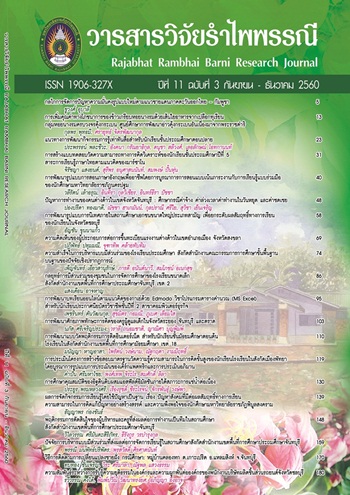THE SUCCESS OF PARTICIPATIVE ADMINISTRATION OF PRIMARY SCHOOLS UNDER THE BASIC EDUCATION COMMISSION BASED ON PHENOMENON
Main Article Content
Abstract
This mixed methods research aimed to study the success of participative administration that compare the success of participative administration factors of administrator behaviors, role of community/social, organizational climate, teacher behaviors and environment discriminant analyze the success of participative administration and analyze phenomenon factors of the success of participative administration of primary schools under the Basic Education Commission by the level of the success of administration. The samples were 930 school administrators, teachers, and the school boards of 310 primary schools under the Basic Education Commission in the east. The research instrument was a 5 rating-scale questionnaires and the structured interview. The statistical used to analysis data were average, standard deviation, multivariate analysis of variance, discriminant analysis and content analysis. The research results were as follows: 1) The success of participative administration of primary schools under the Basic Education Commission by factors of administrator behaviors, role of community/social, organizational climate, teacher behaviors and environment; as a whole and by dimension were rated at the high level. 2) Comparison the success of participative administration of primary schools under the Basic Education Commission found the role of community/ social was different in statistically significance at the .05 level. Other factors were different in no significant. 3) The success of participative administration of schools under the Basic Education Commission distinguish by the high success group and the low success group found the whole factors different statistically significance at the .01 level. The discriminate analysis showed the coefficient of the factors from the highest to the lowest were administrator behaviors(x1), environment(x5), role of community/social(x2), organizational climate(x3) and teacher behaviors(x4). The equation of the discriminant function was: D = 2.886(x1) + .881(x2) – .083(x3) – .553(x4) + .836(x5) – 16.668. The raw scores classification function were:
The high successful schools: Dhigh = 55.062(x1) + 0.988(x2) + 3.625(x3) + 2.133(x4) + 8.341(x5) – 155.807.
The low successful schools: Dlow = 48.480(x1) – 0.862(x2) + 3.813(x3) + 3.393(x4) + 6.435(x5) – 120.742.
The Dhigh and Dlow classification functions predicted the schools to groups correctly with 98.40 and 69.40 percentage ordered, and overall accuracy was 92.58 percentage. 4) The success of participative administration of schools under the Basic Education Commission based on phenomenon factors found the high successful schools and the low successful schools had a method of operation that consistent success and corresponding partially by ascending order from high to low factors as follows: administrator behaviors in transactional leadership, teacher behaviors in teacher's teaching behavior, organizational climate in disengaged behavior, whole environmental, and role of community/social in participation of the school board.
Article Details
References
2. จันทรานี สงวนนาม. 2553. ทฤษฎีและแนวปฏิบัติในการบริหารสถานศึกษา. พิมพ์ครั้งที่ 3. นนทบุรี: บุ๊ค พอยท์.
3. จิณณวัตร ปะโคทัง. 2549. รูปแบบการมีส่วนร่วมของชุมชนในการจัดการศึกษาขั้นพื้นฐานของโรงเรียนดีเด่น โรงเรียนกันทรารมณ์ จังหวัดศรีสะเกษ. ดุษฎีนิพนธ์การศึกษาดุษฎีบัณฑิต มหาวิทยาลัยบูรพา.
4. ดวงสมร กลิ่นเจริญ. 2545. ปัจจัยที่ส่งผลต่อประสิทธิผลการจัดการศึกษาของโรงเรียนเอกชนอาชีวศึกษา. ปริญญาครุศาสตรอุตสาหกรรมดุษฎีบัณฑิต สถาบันเทคโนโลยีพระจอมเกล้าเจ้าคุณทหารลาดกระบัง.
5. ประเสริฐ บัณฑิศักดิ์. 2540. การวิเคราะห์ปัจจัยที่ส่งผลต่อประสิทธิผลองค์การของหน่วยศึกษานิเทศก์ กรมสามัญศึกษา. ดุษฎีนิพนธ์ครุศาสตรดุษฎีบัณฑิต จุฬาลงกรณ์มหาวิทยาลัย.
6. ภารดี อนันต์นาวี. 2545. ปัจจัยที่ส่งผลต่อประสิทธิผลของโรงเรียนประถมศึกษาสังกัดสำนักงาน คณะกรรมการการประถมศึกษาแห่งชาติ. ดุษฎีนิพนธ์การศึกษาดุษฎีบัณฑิต มหาวิทยาลัยบูรพา.
7. มุทิตา แพทย์ประทุม. 2549. รูปแบบการมีส่วนร่วมของชุมชนกับสถานศึกษาขั้นพื้นฐานเพื่อพัฒนาด้านสิ่งแวดล้อม. ดุษฎีนิพนธ์การศึกษาดุษฎีบัณฑิต มหาวิทยาลัยบูรพา.
8. เมตต์ เมตต์การุณ์จิต. 2547. การบริหารจัดการศึกษาแบบมีส่วนร่วม: ประชาชน องค์กรปกครองส่วนท้องถิ่นและราชการ. กรุงเทพฯ: บุ๊ค พ้อยท์.
9. วันเพ็ญ บุรีสูงเนิน. 2552. ปัจจัยที่ส่งผลต่อความสำเร็จในการบริหารสถานศึกษาขั้นพื้นฐานเขตพัฒนาพื้นที่ชายฝั่งทะเลตะวันออก. ดุษฎีนิพนธ์ปริญญาปรัชญาดุษฎีบัณฑิต มหาวิทยาลัยศิลปากร.
10. ศิริวรรณ เสรีรัตน์และคณะ. 2539. องค์การและการจัดองค์การ. กรุงเทพฯ: วิสุทธิพัฒนา.
11.สมจิตร อุดม. 2547. ปัจจัยที่ส่งผลต่อความสำเร็จในการบริหารโรงเรียนเอกชนระดับประถมศึกษาในภาคใต้. ดุษฎีนิพนธ์การศึกษาดุษฎีบัณฑิต มหาวิทยาลัยศรีนครินทรวิโรฒ ประสานมิตร.
12. สำนักงานคณะกรรมการการศึกษาขั้นพื้นฐาน. 2547. คู่มือการปฏิบัติงานคณะกรรมการสถานศึกษาขั้นพื้นฐาน. กรุงเทพฯ: โรงพิมพ์คุรุสภาลาดพร้าว.
13. _______. 2554. แนวทางการประเมินคุณภาพตามมาตรฐานการศึกษาขั้นพื้นฐาน เพื่อประกันคุณภาพภายในสถานศึกษา. กรุงเทพฯ: โรงพิมพ์สำนักงานพระพุทธศาสนาแห่งชาติ
14. _______.2558. แผนปฏิบัติการประจำปีงบประมาณ พ.ศ. 2559 สำนักงานคณะกรรมการการศึกษาขั้นพื้นฐาน กระทรวงศึกษาธิการ. (อัดสำเนา)
15. สำนักงานคณะกรรมการการศึกษาแห่งชาติ. 2545. พระราชบัญญัติการศึกษาแห่งชาติ พ.ศ. 2542 และแก้ไขเพิ่มเติม (ฉบับที่ 2) พ.ศ. 2545. กรุงเทพฯ: พริกหวานกราฟฟิค.
16. สำนักงานบริหารยุทธศาสตร์กลุ่มจังหวัดภาคตะวันออก. 2557. แผนพัฒนากลุ่มจังหวัดภาคตะวันออก ปี พ.ศ. 2557-2560. ชลบุรี: ส่วนแผนและงบประมาณทางการศึกษาท้องถิ่น.
17. สำนักงานเลขาธิการสภาการศึกษา. 2554. กฎหมายว่าด้วยการศึกษาแห่งชาติ กฎหมายว่าด้วยระเบียบบริหารราชการกระทรวงศึกษาธิการ กฎหมายว่าด้วยระเบียบข้าราชการครูและบุคลากรทางการศึกษา. พิมพ์ครั้งที่ 2. กรุงเทพฯ: วี.ที.ซี.คอมมิวมิเคชั่น.
18. สุวิชา วิริยมานุวงษ์. 2554. การวิจัยและพัฒนารูปแบบการมีส่วนร่วมของสถานศึกษากับชุมชนในการจัดการศึกษาขั้นพื้นฐาน. ดุษฎีนิพนธ์ปรัชญาดุษฎีบัณฑิต มหาวิทยาลัยราชภัฏราชนครินทร์.
19. สุวิมล ติรกานันท์. 2553. การวิเคราะห์ตัวแปรพหุในงานวิจัยทางสังคมศาสตร์. กรุงเทพ: จุฬาลงกรณ์มหาวิทยาลัย.
20. เสริมศักดิ์ วิศาลาภรณ์. 2552. สภาพการจัดการศึกษาในจังหวัดชายแดนใต้. พิมพ์ครั้งที่ 3. กรุงเทพฯ: วี.ที.ซี. คอมมิวนีเคชั่น.
21. Amenu – Tekaa, Chistian E.K. 1988. Perception of Community participation in Education on Canadian Indian Reserves: A North – Central Alberta Case Study. (CD – ROM) Doctoral issertation, University of Pittsburgh Abtract availabke: Propose File; Dissertation.
22. Bass, B.M. (1985). Leadership and performance beyond expectations. New York: The FreePress.
23. Cohen, J.M. and Uphoff, N.T. (1980). Participation’s place in rural development: Seeking clarify through specificity world development 8. Cornell University: Rural Development Committee Center for International Studies
24. Cronbach, L. J. 1990. Essentials of psychological testing (5 th ed.). New York: Harper Collins.
25. Fiedler, F.E. (1967). A Theory of Leadership Effectiveness. New York: McGraw – Hill.
26. Gold, S.E. Community organizing at a neighborhood high school: Promises and dilemmas in building parent-educator partnership and collaborations. Pro Quest Digital Dissertations, 60(7) (2000, January): 295.
27. Harris, B.M. (1969). In – service Education. Englewood Cliffs: Prentice – Hall.
28. Hoy, W.K., & Miskel, C.G. 2001. Educational administration: Theory, research and practice (6th ed.). New York: McGraw-Hill.
29. Krejcie, R.V., and Morgan, D.W. 1970. Determining Sample Size for Research Activities. Education and Psychological measurement. 607 – 610.
30. Likert, R. (1967). The human organization: Its management and value. New York : McGraw-Hill.
31. Robbins, S.P. & Maree, M. (2002). Management. New York: Delmar Learning.
32. Shadid, W. et al. 1982. Access and participation: a theortical approach in participation of the poor in development. New York: McGraw-Hill.
33. White, Alastair T. 1982. Why Community Participation, Annual UN. Report A Dicussion of The Agrument Community Participation: Current issue and lesson learned. Boston: Prentice Hall.


